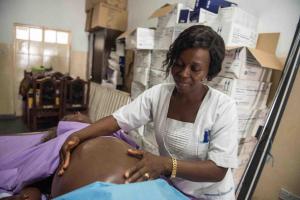Training clinicians to provide lifesaving emergency care for women and newborns
FREETOWN, 23 October 2017 --- In Sierra Leone, giving birth is one of the most dangerous times in a woman’s life. According to the most recent UN estimates, the country has one of the highest maternal mortality rates in the world, at 1,360 deaths per 100,000 live births (UN, 2015). In simpler terms, this means that for every 100 babies born in the country, approximately one woman will lose her life. The nation also has high rates of neonatal deaths, and over 7,500 stillbirths are estimated to occur each year (WHO, 2013).
Many factors underlie these tragic deaths, the majority of which are largely preventable, treatable complications that occur during and after childbirth.
The Government’s 2016 Maternal Deaths Surveillance and Response Report recently analyzed all maternal deaths reported through the national surveillance system in 2016. It identified the leading causes as bleeding, responsible for over half of the fatalities, followed by eclampsia (seizures linked to high blood pressure) and sepsis. 8 in 10 of these deaths occurred within health facilities, indicating an urgent need to strengthen the quality of emergency obstetric services that are available to women and newborns.
“Most maternal and newborn deaths can be prevented with the right care at the right time,” explains Dr. Fatu Forna, Lead for Reproductive Health at WHO Sierra Leone. “A stronger emergency care system for pregnant women in Sierra Leone could save the lives of thousands of women and their babies, especially when combined with effective antenatal services and concerted actions to prevent, detect and tackle these common causes of death, promote healthy behaviours, and improve access to family planning services.”
As one core part of this equation, the Ministry of Health and Sanitation with support from UKAid and WHO has now rolled out an ambitious new training programme for midwives in Emergency Obstetric and Newborn Care (EmONC). The competency-based training is designed to ensure that nurses, midwives and doctors have the skills and knowledge they need to save the lives of women and their newborns and uses a new national harmonized EmONC curriculum.
Midwife Margaret T. Sesay is supporting the mentorship and on the job training components of the programme. “It is very important to ensure clinicians know what to do when faced with common life threatening conditions, for instance if a patient presents with seizures, if the placenta is retained, or if the baby is not breathing,” she says. “The practical elements of the scheme also familiarize the team with their respective roles and responsibilities in an emergency, when everyone needs to act quickly and work together to save lives.”
The two-week EmONC training programme includes lectures and seminars; practical skills training using standardized protocols, and is followed by on the job mentorship, which takes place within the staff’s own workplace. During the programme, health workers are assessed to check that they know how to perform essential emergency interventions safely such as newborn resuscitation, treatment of haemorrhage, manual removal of placenta, and assisted deliveries.
The EmONC programme is led by the Ministry with support from the UK Government through WHO and UNFPA, who will support further roll-out of the scheme. It is firstly being piloted at maternity hospitals in Freetown, Makeni, Bo, and Kenema and will expand to the remaining districts through 2018.



